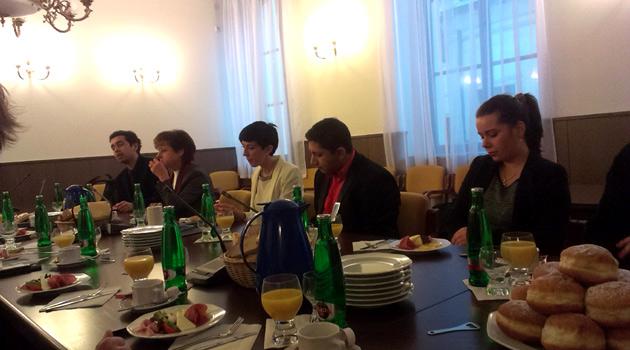Romani college students hold discussion in the Czech Parliament

Yesterday a breakfast meeting was convened between Romani college students and women members of the Czech lower house. The meeting took place on the occasion of the seventh anniversary of the announcement of the infamous European Court of Human Rights judgment of 2007 in the case of D.H. and Others vs. the Czech Republic.
That judgment confirmed that Romani children face discrimination in the Czech schools and are being unlawfully streamed into special education. Yesterday’s event was convened by the Open Society Fund Prague in collaboration with the Roma Education Fund and the ROMEA organization.
During the working breakfast, Romani students had the opportunity to present their opinions about the Czech education system and their experiences with it to the MPs, as well as to familiarize themselves with the opinions of those MPs on the position of the Romani minority in the Czech education system and society in general. "We continue to hear that it is necessary to change the attitude of Romani children and parents toward education, but there is no mention of the fact that change is necessary on both sides – not just on the side of the children, but also on the side of the educators," said Andrea Červeňáková, a graduate in social work from Ostrava University.
"Our school system does not train teachers to work with Romani pupils or with the children of foreigners," Červeňáková said. "This is related to teachers’ unwillingness to admit that change is necessary on their side as well."
Czech MP Markéta Adamová (TOP 09), the chair of the Subcommittee on Human Rights under whose auspices the meeting took place, also shared her opinions. "In Czech society there is a very negative sentiment toward the Romani minoirty based on many myths and prejudices. Every example that helps refute those prejudices and helps establish mutual dialogue is, in my view, very necessary," Adamová said.
"We are glad this meeting between the women members of the Parliament of the Czech Republic and young Roma has taken place – we view it as a first step toward future collaborations between these college students and MPs, as well as toward their participation in eliminating discrimination against Romani people, and not just in the education system," said Jan Stejskal, the Roma Education Fund’s facilitator for the Czech Republic. Czech MP Adamová also expressed support for the idea of nonprofit organizations awarding scholarships to Romani students.
"Support for Romani students through scholarships should be the domain of the nonprofit sector, not the state. The state cannot target financial aid on the basis of ethnic affiliation. That would be, for me, an unequivocal point of controversy," Adamová said.
Students who demonstrate that they and their families care about education and that they want to become professionals are supported in the Czech Republic through REF scholarships. "Czech society still considers Romani people in higher education an anomaly. Through these scholarships, REF supports many students who have demonstrated that they and their parents value education, that they are studying interesting fields, and that they want to become professionals," said Iva Hlaváčková, who coordinates the REF scholarship program in the Czech Republic for the ROMEA organization.
Emphasis on desegregated education
The working breakfast was followed by a seminar during which the MPs were familiarized with the Czech Government’s "Strategy for Romani integration to 2020". According to Adamová, the Czech Republic has been endeavoring to address coexistence between the majority society and Romani people for 25 years and has been incapable of finding a functional way forward.
"We need strategies of this type and it will be all to the good if they are adopted across the political spectrum. That’s why I have convened this seminar at a time when this document is in the commenting phase and it is still possible to respond to expert recommendations about it. What is important, for example, is its emphasis on desegregated education, i.e., the enrollment oOf children into the regular schools," the MP said.
Others who discussed the new strategy at the seminar included Martina Štěpánková, director of the Czech Government’s Human Rights Section; Czech MP Ivan Gabal, who is also a sociologist; David Beňák, Vice-Chair of the Czech Government Inter-ministerial Commission on Romani Community Affairs; and František Kostlán, a publicist with the ROMEA organization. Representatives of other organizations such as Caritas Czech Republic, the Czech Helsinki Committee, the Multicultural Center Prague and the Romani Culture House (Dům romské kultury) also attended.